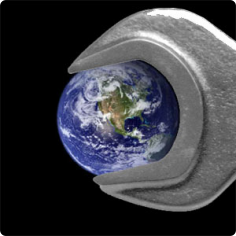Billionaires and geoengineering
The millionaires apparently plan to advance - and then impose - these dangerous technological prescriptions without consulting anyone.
- Opinión

Global billionaires are now investing in geoengineering: technologies to manipulate the climate. It's logical, but very worrying. Geoengineering proposals are still theoretical and speculative, but they work as an excuse for climate inaction and as an alibi for increasing the extraction and use of fossil fuels, claiming that climate chaos can be "managed" with these risky technologies.
Bill Gates, founder of Microsoft, was the first of the club of the superrich to invest funds to research and develop these technologies (https://tinyurl.com/y48824ak). Several others come from Silicon Valley, the Californian area where many technology companies are based. Some are discreet, others remain anonymous, funding NGOs or limited liability companies where their names do not appear.
The millionaires apparently plan to advance - and then impose - these dangerous technological prescriptions without consulting anyone, without independent oversight or regulation, and bypassing the precautionary decisions of the international community. This is a common way for the technological titans to act, as Mark Zuckerberg summarized at the beginning of Facebook: "move fast and break things". Geoengineering has two technological directions: removing carbon from the atmosphere (once emitted) and blocking/reflecting some of the sun's rays, to lower the temperature. In no case does it contemplate changing the causes of climate change, but after having "broken things", it proposes technological recipes that open new businesses.
In October 2020, the California-based SilverLining group announced that it will fund $3 million in research into "solar radiation management" technologies, such as brightening sea clouds or blocking the sun's rays with artificial volcanic clouds, and other proposals that if done on a large scale will have strong negative impacts, such as droughts and disruption of rainfall. In 2010, then as a company, SilverLining attempted to conduct cloud brightening experiments off the coast of California over thousands of square kilometers, but after the media revealed that the project was funded by Bill Gates, the project was suspended (https://tinyurl.com/yxrg29yy). Kelly Wanser, then director of the company, later reappeared on a University of Washington "Marine Cloud Brightening Project" and claimed that they were just a group of scientists who did not have funds for experiments. Now they present themselves as an NGO. Wanser continues as director and announces that the new NGO will support the research project of several of these scientists and other well-known promoters of geoengineering. This time financed by millionaires and venture capitalists Matt Cohler, formerly a senior executive at Facebook; Bill Trenchard, an investor in Uber and other platforms such as LiveOps, bought by Microsoft; the investment firm Lowercarbon Capital, of investor Chris Sacca, formerly an executive at Google and an investor in Twitter, Instagram, Uber and others; the Pritzker Innovation Fund, owned by one of the 10 richest families in the United States according to Forbes; and the LAD Climate Fund, of which Silver Lining gives no references, but which could be linked to large conservation NGOs. Chris Sacca explains in an interview that in Lowercarbon Capital, they see no problem in receiving funds from companies like Exxon and Chevron (https://tinyurl.com/y3p35s5j)
In September 2020, the magazine New Scientist revealed that another group of marine geoengineering developers met in California. Technicians, lawyers and consultants were called together by Oceankind, another new organization of an "anonymous" billionaire, to discuss how to advance "enhanced ocean alkalinization" a method of artificially changing the chemistry of the seas. According to New Scientist, Oceankind's first director, Evan Rapoport, was a senior executive at Google, then hired by "a wealthy Silicon Valley family" for the position (https://tinyurl.com/y27qpnmf).
Ocean acidification is a serious global problem that is mainly due to excess carbon dioxide being absorbed by the oceans, causing mollusks, crustaceans and other organisms to be unable to form their shells and also affecting coral reefs. To prevent it, pollution (from oil, wastes, agricultural runoff) must be strongly controlled and carbon emissions drastically reduced. Instead of addressing the causes, the proposal in this case is to alkalinize the ocean with crushed rock, which would imply an exponential increase in mining, with the consequent environmental and social problems that it entails. It is estimated that it would take 5 billion tons of crushed rock annually, twice the amount of rock currently used by the entire cement industry globally. Even if it were to work to alkalize the ocean, this industry and the fleets of ships to disseminate it would increase greenhouse gas emissions and climate change.
Because of the high risks and side effects involved, geoengineering is under a moratorium in the UN Convention on Biological Diversity. Billionaires and their technological giants have a huge environmental footprint and embody the lion's share of global climate and social injustice. We cannot allow them to also control the global thermostat.
- Silvia Ribeiro, ETC Group Latin America Director.
More information on geoengineering: www.geoengineeringmonitor.org
Del mismo autor
- Guerra y alimentos 29/03/2022
- La disputa sobre quién nos alimenta 16/02/2022
- Científicos llaman a parar la geoingeniería solar 31/01/2022
- Vacunas transgénicas: experimento masivo 28/09/2021
- Cumbre de los dueños de la alimentación 07/07/2021
- Datos biométricos y capitalismo de vigilancia 14/05/2021
- COVAX: la trampa 29/04/2021
- Maíz, transgénicos y transnacionales 29/04/2021
- Prohibir cubrebocas con nanomateriales 12/04/2021
- El legado de la pandemia 16/02/2021
Clasificado en
Clasificado en:
Crisis Ambiental
- Paula Bianchi 07/04/2022
- Leonardo Boff 05/04/2022
- Gabriela Ramírez, OBELA 04/04/2022
- Gabriela Ramírez, OBELA 04/04/2022
- Aviva Chomsky 28/03/2022
Cambio Climático
- Leonardo Boff 15/02/2022
- Prabir Purkayastha 14/02/2022
- Prabir Purkayastha 13/02/2022
- Jake Johnson 09/02/2022
- Jomo Kwame Sundaram 26/01/2022
